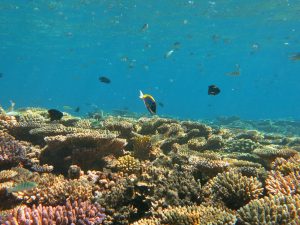The Maldives has halted coastal development projects in the face of a potentially catastrophic mass coral bleaching event.
On May 9, the Environmental Protection Agency (EPA) ordered the suspension of activities such as dredging, reclamation, and sand pumping until June 10 to minimize “further anthropogenic stress on our coral reefs.” The agency hoped mitigation measures could “help reefs cope with or recover from coral bleaching events and build resilience against future disturbances related to climate change.”
The climate crisis poses an existential threat to the 1,192 islands of the Maldives archipelago that stand just one meter above sea level, President Dr. Mohamed Muizzu reiterated that in an op-ed for the U.K.’s Guardian newspaper on Saturday, highlighting record-breaking heat and more frequent and powerful storms as visible impacts in the present day.
Advocating on behalf of small island developing states (SIDS) ahead of an upcoming U.N. conference, Muizzu appealed for new criteria to fund climate resiliency for vulnerable island nations that are ineligible for cheaper financing reserved for low-income countries.
Muizzu touted the creation of Hulhumalé, a reclaimed artificial island near the densely-packed capital Malé elevated two meters above sea level, as a model for adaptation.
“It was a lifeline, a blueprint for survival that has since evolved into a thriving urban center. Similarly, our upcoming project, Ras Malé, aims to be the Indian Ocean’s first eco-city, raised three meters above sea level. This is true climate adaptation if ever I saw it,” he argued, criticizing the refusal of climate financiers and multilateral banks to fund such projects classed as infrastructure work.
However land reclamation poses a controversial dilemma for the Maldives. The process of dredging up sand from the ocean floor and piling it on shallow lagoons damages sensitive coral reef ecosystems and defenses. Environmental groups decried widespread reclamation in recent years as “ecocide” that causes irreversible destruction.
But with land accounting for just one percent of the country’s 90,000 square kilometer territory, successive governments have maintained the need for additional land to build housing, infrastructure, and safer higher ground.
“The Maldives appears to be stuck between a rock and a hard place,” David R. Boyd, U.N. Special Rapporteur on the right to a healthy environment, observed after a visit in April.
“It is untenable to do nothing to protect these extraordinarily vulnerable islands from the existential threat of rising sea levels. Yet reclamation is also highly problematic, damaging nature’s defense mechanisms, jeopardizing marine biodiversity, and sabotaging the ecosystems that attract millions of tourists annually,”
The U.N. expert conceded that land reclamation done sustainably could build resilience but advised that it “should be distinguished from projects done for luxury tourism.” The Maldives Association of Tourism Industry, a powerful group representing resort operators, urged compliance with the EPA’s suspension of coastal development work.
In his op-ed, Muizzu lauded the decision to pause development projects over coral bleaching, as his administration is taking environmental stewardship as a serious responsibility.
But it emerged last week that the reclamation of a lagoon was continuing with a special permit granted for a $343 million resort project by Qatar’s Estithmar Holding. An exception was made for the developer to avoid paying large sums to contractors as daily penalties for delays, Environment Minister Thoriq Ibrahim told local media.
The first Maldives property of the ultra-luxury Rosewood brand is part of a new trend of resorts developed on reclaimed islands. In recent years, the tourism industry has been evolving from the traditional “one-island, one-resort” model to integrated multi-resort destinations on clusters of manmade islands.
Meanwhile, the EPA was also looking into reports of noncompliance with the order to stop dredging and reclamation.
“There’s not much that can be done to combat bleaching… The only thing that can be done is to reduce the amount of stress that humans put on the corals during bleaching,” EPA Director General Ibrahim Naeem told the media.
Caused by a naturally occurring phenomenon called El Niño that leads to warmer waters, bleaching occurs when the symbiotic relationship between corals and a micro-alga called zooxanthellae is disrupted, forcing the coral to expel the food source and turn white. Bleached coral could starve and die.
The Maldives recovered relatively quickly after previous bleaching events. But the current El Niño could be “the worst bleaching event in the history of the planet,” Derek Manzello, the coordinator of U.S. National Oceanic and Atmospheric Administration’s Coral Reef Watch, which serves as the global monitoring authority on coral bleaching risk, told Reuters.
The problem is exacerbated by average temperatures rising over 1.5 degrees Celsius above preindustrial levels over the past year. If the rise of 1.5C persists, scientists estimate that 90 percent of the world’s corals could be lost.
Following his visit in April, Boyd, the U.N. special rapporteur, warned that the Maldives faces “a potentially dystopian future” because of the climate emergency wrought by wealthy industrialized nations.
Long before the islands disappear under the waves, “the Maldives could become virtually uninhabitable due to the combined impacts of sea level rise, severe heat, floods, coastal erosion, [and] increased frequency of extreme weather events,” he said.

































